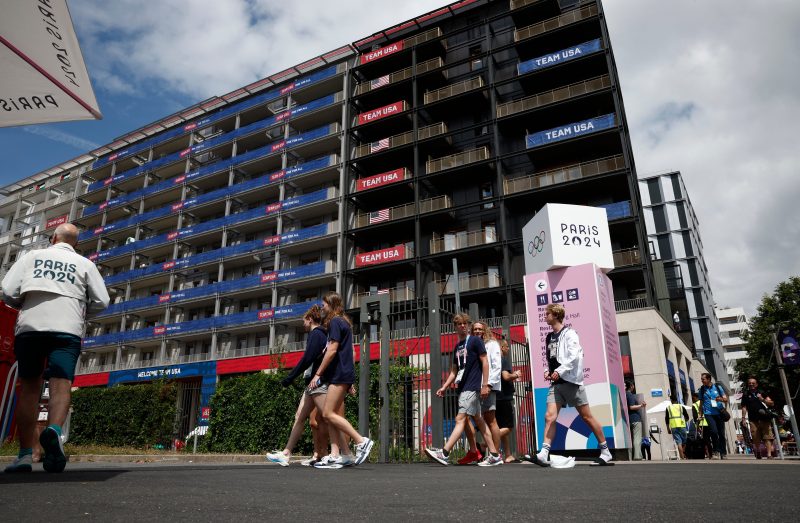Five Australian water polo players have tested positive for COVID-19 and are in isolation at the Paris Olympics. But the 2024 Games are not as restrictive as the pandemic-delayed 2020 Tokyo Olympics, and there are no stringent protocols in place for athletes who test positive.
When the first player on the team tested positive Tuesday, Australia’s Olympic team chief Anna Mears told Reuters, ‘I need to emphasize that we are treating COVID no differently to other bugs like the flu. This is not Tokyo. The athlete is not particularly unwell and they are still training but sleeping in a single room.’
The players are cleared to train if they feel well enough, and the virus is contained to the water polo team at this time, Mears said, according to Le Monde. They are wearing masks and isolating from other team members when not training, and the whole team has been tested.
‘We have our respiratory illnesses protocol in place and we have reinforced with all of the teams as they arrive into our village,’ Mears said. ‘Two basic rules around that really simple hygiene practices are effective. And if you are feeling unwell or have any symptoms, get tested.’
The Paris Games may be a welcomed return to normalcy after the compulsory testing, quarantine and empty venues that marked Tokyo, but there are still precautions in place for those who test positive.
Meet Team USA: See which athletes made the U.S. Olympic team and where they are from
‘Of course COVID is here. We’ve seen a small peak’ in cases, French Health Minister Frederic Valletoux told a franceinfo broadcaster. ‘But we are far from what we saw in 2020, 2021, 2022.
‘Some precautions are being taken but, because the level at which COVID is spreading is very low, they depend on the organisers.’
Valletoux said there is no risk of a major COVID cluster in France. However, with a dense population of athletes in the Olympic Village, there is an inherent risk of any infectious disease spreading.
Here’s a closer look at how Team USA plans to mitigate this risk.
Are there specific COVID protocols at the Paris Olympic Games?
In Paris, there will be no specific COVID restrictions and the virus will be handled in the same way as a common cold or the flu. That means there will be no asymptomatic testing of athletes, mask mandates or isolation periods.
However, Jonathan Finnoff, the chief medical officer at the U.S. Olympic & Paralympic Committee, said the USOPC will follow CDC guidelines to prevent the spread of all respiratory viruses, including COVID-19, the flu and respiratory syncytial virus (RSV).
These include five core prevention strategies: immunization, proper hygiene, clean air, treatment and staying home when sick. And three additional prevention strategies: masks, social distancing and regular testing. The CDC also recommends staying home and away from others until your symptoms are getting better and you are fever-free for 24 hours, and then use added precautions for the next five days.
“We won’t do anything beyond what the CDC is recommending, but we absolutely want to prevent the spread of infectious disease,” Finnoff said, adding that respiratory infection hinders athletes’ “ability to compete at the highest level.”
What happens if a U.S. athlete tests positive for COVID at the Olympic Games?
If a Team USA athlete experiences symptoms of any kind, Finnoff reiterated the USOPC is “going to follow the CDC guidelines for all of infectious disease protocols.”
According to Finnoff, each of Team USA’s medical clinics will have a separate room dedicated to treating infectious diseases, where medical staff will first administer a PCR test capable of identifying several pathogens to pinpoint the exact problem. Once a specific pathogen is detected, medical staff will follow tailored treatment plans to minimize both symptoms and duration of an illness.
The USOPC will bring this comprehensive testing equipment to Paris, Finnoff said.
Although there will be no official isolation or quarantine period imposed, athletes who have tested positive for a respiratory illness will be moved into their own rooms to prevent the spread of infectious diseases between roommates, according to Finnoff.
“It doesn’t mean [infected athletes] can’t train or compete,” Finnoff said. “We’ll do that based on their symptoms and how they feel, but we do want to prevent [them] from infecting those around them, and we’ll also provide prophylaxis based on what is recommended by CDC guidelines.”
Are COVID vaccinations required at the Olympics?
The USOPC does not require athletes to vaccinate themselves against COVID, but it strongly recommends they stay up to date on vaccinations and boosters.
Finnoff said the USOPC “absolutely promotes” vaccination and other standard public health practices like hand washing and mask-wearing to athletes.
“It’s not mandated, but it’s explaining ‘this is how many people get sick if they don’t follow these protocols,’” Finnoff said.
Can athletes still compete at the Paris Olympics if they test positive for COVID?
The short answer is yes. According to Finnoff, there are no set rules in place to stop Team USA members from choosing to compete if they have a positive COVID test result. However, athletes might be unable to — or choose not to — compete if their symptoms are severe enough.
“It’s not a black and white,” Finnoff said.
For the Australian water polo who tested positive, Mears also did not offer a clear-cut answer, saying ‘in terms of competitions, we will wait until she gets the all clear and we get the information from our chief medical officer.’






